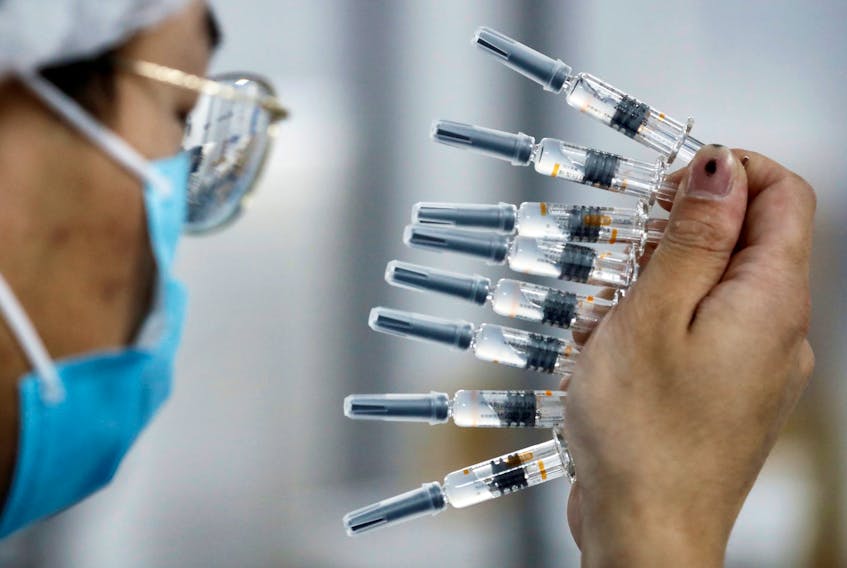Just because some pharmaceutical companies have released their COVID-19 vaccine, it doesn’t mean research into the creation of a better immune response in vaccine recipients has ended.
For instance, the Pfizer and Moderna vaccines must be refrigerated at low temperatures, but IMV Inc. in Dartmouth is working on a manufacturing method that will allow its DPX-COVID-19 vaccine to be stored at 2-8 C and room temperature for at least three months, which allows for long-term stability without the need for extensive cold-chain infrastructure.
IMV Inc., a biopharmaceutical company started at Dalhousie University and later commercialized, is pioneering a novel class of cancer immunotherapies and vaccines that fight against infectious diseases.
When it comes to the COVID-19 virus, the company has indicated that it has received encouraging data.
“Results are consistent with the mechanism of action of our DPX delivery platform demonstrated across prior clinical studies with DPX-based vaccines and cancer immunotherapies,” Joanne Schindler, IMV’s chief medical officer, said in a recent news release.
DPX-COVID-19 blends vaccine and immunotherapy science to generate an immune response that targets specific weaknesses of the coronavirus with the goal to optimize safety and efficacy.
Fully synthetic, DPX-COVID-19 is a formulation of IMV’s DPX delivery platform with four complementary peptide antigens that were selected for their ability to provoke an immune response.
IMV’s delivery platform would have the potential to provide large-scale manufacturing to supply doses more rapidly than more conventional vaccines, the company stated.
“By prolonging exposure to antigens, the DPX platform can generate longer-lasting antibody (concentration) in humans . . . and it has the potential to improve the span of protection against COVID-19, including in the most vulnerable populations,” Schindler said in the release.
IMV is planning to conduct complementary preclinical studies, including testing on new variants of the virus, and will provide an update on its revised clinical plan in the first quarter this year.
None of the reported virus mutations are in the areas of the four selected peptides in DPX-COVID-19. By targeting areas less prone to mutations, DPX-COVID-19 has potential to offer protection against a broader range of circulating variants, according to the company.
MEDMIRA
Meanwhile, Halifax’s MedMira Inc., which has been trying to get approval of its RevealCOVID-19 PLUS Total Antibody Test for emergency usage from the U.S. Food and Drug Administration, recently announced it validated the test for the detection of total antibodies against the nucleocapsid and spike regions of the SARS-CoV-2.
It is an update to MedMira’s total antibody test. It addresses the total antibody testing requirement from recent developments in COVID-19 vaccines.
According to MedMira, the vaccines from Pfizer and Moderna authorized for use in the United States and Canada generate neutralizing antibodies against the spike protein of the SARS-CoV-2 virus in order to provide the necessary protection.
“The discovery of at least two new mutations of the SARS-CoV-2 spike protein leads to a more urgent need to enhance the antibody test with the capability to detect the antibodies against those specific regions,” according to a news release.
MedMira is developer and owner of rapid vertical flow technology. It’s rapid test applications built on it provide hospitals, labs, clinics and individuals with instant diagnosis for diseases such as HIV and hepatitis C in three steps, using a drop of blood or plasma.
The company’s RevealCOVID-19 PLUS Total Antibody Test uses the technology to provide the ability to detect antibodies to the SARS-CoV-2 spike.
“This new advancement shares the same easy-to-use features with the previous product version, while adding a modified spike antigen to address the growing total antibody testing need for both pre- and post-vaccination,” the company stated.
“As the stage of the pandemic shifts to vaccination, it is imperative that MedMira can adjust. As a result, and in consultation with our partners, MedMira decided to move forward with a simple solution by launching RevealCOVID-19 PLUS Total Antibody,” said MedMIra CEO Hermes Chan.
“This shall enable us to introduce the new product version and address the additional market demands, focusing our attention on the production of 50,000 units of RevealCOVID19 PLUS Total Antibody Test daily.”
Chan said in the release that MedMira will be positioned as a major contender in the coming months, as the vaccines are being administered globally.
SONA NANOTECH
Another Dartmouth company, Sona Nanotech Inc., which is developing rapid, point-of-care diagnostic tests, recently announced it has been granted CE Mark status for its rapid COVID-19 antigen test.
The CE Mark indicates the test conforms to European Union regulations and allows Sona to commercialize it throughout Europe and potentially other territories in which the CE Mark is recognized, according to the company.
Sona management indicated in a news release that it intends to begin selling its test as a tool for organizations wishing to screen individuals in “high-risk congregate settings in which testing could quickly identify persons with a SARS-CoV-2 infection to inform infection prevention and control measures to reduce risk of transmission.”
From nasopharyngeal swab specimens from individuals who are suspected of being exposed to COVID-19, the Sona test reportedly provides results within 15 minutes.
The company stated that it continues to work with potential partners to secure an additional clinical trial to support other potential regulatory submissions. Any trial would require a sponsoring institution, a principal investigator, a study protocol, relevant medical ethics review board approval and Health Canada Investigational Testing Division approval.









